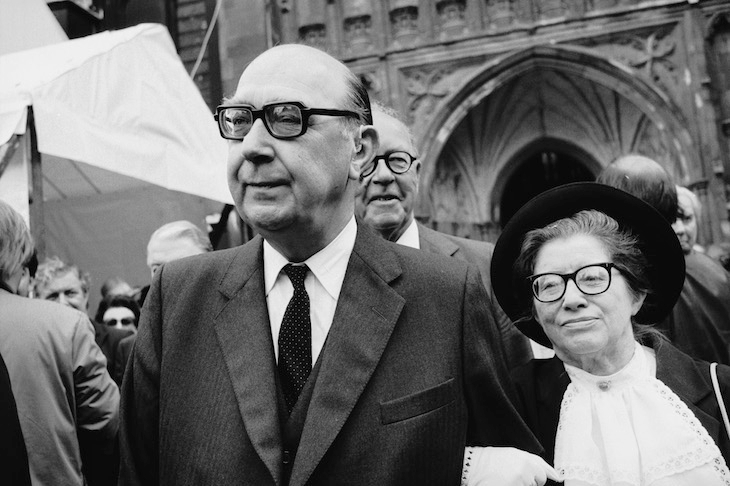Adrian Fry Finnegans Wake was penned, it can now be revealed, not by James Joyce, but by the young Anthony Burgess. According to Dr Avril Fo of the Textual Autopsy Unit at the University of Ancoats, ‘Joyce, ageing and losing his sight, subcontracted the writing of this extraordinary work of modernism to ardent fan, Anthony Wilson, who would later change his name to Burgess and write A Clockwork Orange. Mancunian polymath Burgess shared Joyce’s taste for multilingual obscurantism and puns too erudite to elicit laughter. We ran the text through our analytic computers backwards, forwards, even diagonally, until proof emerged: Burgess places three Mancunian street names in the text, albeit rendering them phonetically in ancient Aramaic and pidgin Malay. This is typical of his ludic desire to signal authorship without owning up. Burgess knew the work would have greater cachet as the supreme work of Irish blarney than just another whimsical English pastiche.’
D.A. Prince Shocked disbelief has greeted revelations of Enid Blyton’s role as a significant player in Russia’s KGB, running teams of undercover anti-British agents while writing her widely read children’s books. Files recovered from a Moscow source (codename Noddy) reveal not only coded socioeconomic information — vital for Russian infiltration of British youth — transmitted through generations of novels but also tradecraft and working methods. Blyton’s audacity, working in plain sight, is staggering: the Secret Seven and the Famous Five were her teams, reporting to her direct via ‘fan’ letters — the very letters to which, she proudly boasted, she replied personally. Key words such as ‘lemonade’ (now identified as British nuclear capability), ‘the grown-ups’ (code for senior Cabinet members) and ‘picnics’ (specific espionage exercises) were employed, which would arouse no suspicion had the letters been intercepted. MI5 is now researching her entire print oeuvre to establish the scale of her activities.
Katie Mallett It is well known that the novelist Anthony Trollope had a second career in the Post Office, travelling all over the world as a postal surveyor. It was he who recommended the use of postboxes, which became known as pillar-boxes, and he installed many of these, especially in the Channel Islands. However, a discovery near Garland’s Hotel, his last residence in London, has revealed the startling fact that he had an obsession with the Royal Mail, prowling the streets at night to inspect pillar-boxes, and even opening them with a skeleton key he’d had made. A package, dug up during roadworks in Pall Mall, contains 163 undelivered letters, and a secret diary revealing his clandestine nocturnal activities. It is thought this odd and illegal behaviour stems from his failure to attain the post of Assistant Secretary on the retirement of Rowland Hill.
Bill Greenwell The literary world has been startled by news that Philip Larkin was actually two people — he had an identical twin, who worked on the famous poems while Philip worked as Hull University’s librarian. ‘This explains everything,’ commented biographer Sir Andrew Motion. ‘For years we’ve grappled with his overlapping affairs, and seeming ability to complete 9-5 shifts, while crafting elegant verse. Now we see how he — or rather they — did it.’ Lord Bragg, who interviewed him in 1982, confessed himself unsurprised. ‘I’ve always wondered why he was shy of cameras. They feared being spotted.’ From Norfolk, poet Anthony Thwaite confessed he knew all along. ‘His brother Mark — they called one another “Ma” and “Pop” — preferred sauce to gravy. Hence ‘Mr Bleaney’. He sat up editing till Philip went to work, an economy measure.’ Hull councillors are holding emergency meetings over whether to remove Larkin’s statue in the station — or duplicate it.
Max Ross Evidence has come to light that Oscar Wilde did more than play with rent boys. To research his famous tale about Dorian Gray he went round London and committed murder after murder, giving him the taste and feel of the main character in his only novel. Yes, he was almost certainly Jack the Ripper, unable to resist the temptation to show he was above the ordinary mortal, an executioner par excellence. By day he was the family man, the smooth-tongued entertainer, the creator of successful plays who knew the importance of being Earnest or at least seemingly respectable, and by night, when he wasn’t enjoying Bosie’s company or that of sundry fun-seeking youths, he was doing the devil’s work. Strange how his minor indiscretions came to light but his major crimes went unsuspected and undetected. Till now.
Your next challenge is to submit a letter of complaint from a fictional character to his or her or its creator about his, her or its portrayal. Please email entries of up to 150 words (or 16 lines) to lucy@spectator.co.uk by midday on 12 April.





Comments